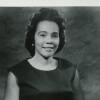On a cold, late-winter evening in Roxbury, staccato rhythms punctuated by crashing cymbals flowed from a stately Victorian house on Elm Hill Avenue, where a group of students practiced their drumline formation in the basement.
Eighteen-year-old Alan Aunaxe beat a message on his snare drum, then cast a look at a fellow drummer in a playful call and response.
“I want everything to sound clean,” Aunaxe said afterward. “You have to be precise, or else it’s going to sound like a splash.”
Drumlines might be a fixture in the U.S. South, but in Boston they are about as common as cheesy grits. Among Boston’s 30 public high schools, there’s just one active marching band — at English High School. The Hamilton-Garrett Center for Music & Arts decided to create its own drumline as a way to honor African American musical tradition in a city that sometimes overlooks it.
WATCH: Boston's HG Drumline celebrates African American musical phenomenon, with serious style
“Drumming has a profound importance within Black culture here in the United States of America,” said the Rev. Dr. Emmett Price III, inaugural dean of Africana Studies at the Berklee College of Music.
The drumline’s esprit de corps lifts people up, celebrating African musical traditions and the regiments of Black fifers and drummers who fought in the Civil War. Price said it also recalls an era when drumming was a form of resistance, especially when it was banned among enslaved people in the United States.
“There were rebellions that occurred because folks were signaling to each other using drums. Almost like Morse code,” Price said.
From resistance to a celebrated art form
Against that backdrop, historically Black colleges and universities, also known as HBCUs, turned drumlines at halftime shows into a cultural phenomenon, making appearances with Beyoncé at Coachella and Lil Nas X at the Grammys.
More Education
The drumlines of HBCUs were an inspiring force behind the scenes at Hamilton-Garrett in Boston.
Gerami Groover-Flores, the program’s executive director, said she would listen to her father, Rev. Dr. Gregory G. Groover, pastor of the Historic Charles Street African Methodist Episcopal Church, talk about the pride he felt in the marching band from his days at Morehouse College, an HBCU in Atlanta.
“That was a space the historically Black colleges and universities provided for these talented musicians who, at a certain point in our history, did not have access to many of the predominately white [higher ed] institutions,” Groover-Flores said.
Groover-Flores left Berklee with undergraduate and graduate degrees, but the feeling resonated even as she studied music in Europe.
”I have a deep connection to it,” she said.
Where the young study musical heritage
The drumline at Hamilton-Garrett was also in step with the center’s vision as a space where young people can learn about their musical heritage.
Ruth Hamilton, half of the center’s namesake, began offering music lessons for children out of the Charles Street AME church in the early 2000s with just four students.
Hamilton was a strong proponent of the Negro spirituals. Elta Garrett, a veteran Boston Public Schools teacher, helped manage the program as it grew.
Last year, Groover-Flores wanted to expand the center’s afterschool program in a meaningful way, drawing in new students and offering musical scholarships to those who can’t afford classes at the center. A drumline seemed like a good fit.
She brought in three Berklee students as coaches and began recruiting youth to try out. She benefitted from a pipeline of students who had played at the Charles Street church’s Sunday services.
By September, she had about a dozen young people who continue to meet and practice together twice or more a week, often for several hours at a time.
Less than six months after its start, the students had one of their first performances at Boston Arts Academy as part of its MLK Day celebration.
The drumline has become a second family for Amari Ruffin-Lacy, who is just 12 years old and plays a bass drum that’s almost as big as him.
“My mom says I been playing the drums since I was in her belly,” he said.
As a preschooler, his mom brought him to Guitar City to play drums while she’d sing. More recently, a grade-school teacher also noticed his love of drumming and won a grant to buy him his first drum kit.
“I’ll never forget that drum set,” Ruffin-Lacy said.
‘Know who we are’
On that recent cold and cloudy winter evening in Boston, the drumline members gathered in the basement of the Roxbury music center.
Aunaxe, one of the drumline leaders, directed the practice. A college student studying biochemistry at Curry College, he’s been playing drums in church since he was in second grade at the Charles Street church.
“I love music more than ... more than anything,” Aunaxe said. “I want us to grow. I want people to see us, I want people to know who we are.”
As the group practices the New Orleans Second Line classic, “Do Whatcha Wanna,” the group wordlessly understands their roles and riffs. At one point, tenor drummer Marvin Ripert makes his quint set echo the sound of steel drums from the Caribbean.
Groover-Flores said the group intentionally incorporates Afro-Latin sounds as a nod to Boston’s large international population spanning the African diaspora.
Aunaxe said that allows the Hamilton-Garrett drumline to produce a unique sound. One that he wants his hometown of Boston to hear.








